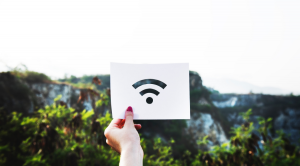What are vicious attacks and do they worry you?
A malicious attack is a form of malicious cyberattack, typically occurring in public locations such as coffee shops, airports or hotels, in which the attacker sets up a fake WiFi network. This fake WiFi network is created to imitate a legitimate network, but its purpose is to trick users into connecting to it instead of connecting to the real network.
When a user connects to this fake WiFi network, the attacker has the ability to intercept and collect unencrypted data transmitted over the network, including sensitive information such as usernames, passwords, numbers, etc. credit card and other personal data.
In this article, we will analyze how malicious attacks work and ask why malicious hotspots are no longer as important a threat as they once were.
How does the vicious attack work
1. Setup
The attacker creates a WiFi hotspot with a name (SSID) that closely resembles the name of a legitimate network available in the area. For example, this could be the name of the coffee shop you're at or it could be something like "Free Airport WiFi" at the airport.
2. Deception
You accidentally connect to a malicious WiFi network because you think it is a legitimate network.
3. Data blocking
When you connect to a fake network, an attacker can eavesdrop on your unencrypted Internet activity, including collecting the passwords and payment details you enter. They can also inject malware into your device or redirect you to phishing websites.
Most connections are now encrypted
Until a few years ago, malicious access points leveraged by hackers were still a serious threat to people using public WiFi networks. The main reason is that most online connections, such as those between your device and a website, are typically not encrypted. Data is transmitted in plaintext, which means that if you accidentally connect to a malicious hotspot, the attacker running it can track your every move on most websites. you access. Using a VPN is the best protection against such attacks.
However, the dangers of a largely unencrypted Internet come not only from threats from public WiFi hackers, but also from allowing many intruders to see everything you do on the Internet. Internet. In response to this pervasive threat, the nonprofit Let's Encrypt campaign began issuing free HTTPS certificates to anyone who requested them in 2015.
Today, more than 300 million websites use Let's Encrypt, quickly becoming the world's largest certificate authority (CA) and ushering in a cryptographic revolution on the web. By January 2024, 85.1% of all websites had switched to using the HTTPS protocol (this number increased to nearly 100% for sites handling sensitive data, such as payment processing sites). maths).
When a website uses HTTPS, the connection between that website and your browser or mobile app is securely encrypted. This prevents hackers and anyone else (like WiFi servers, Internet service providers, or governments) from accessing your data or knowing what you did on the website.
As long as HTTPS is used, an attacker will not be able to use two malicious access points to spy on your browsing activity, even if you connect to their network. All modern browsers provide an explicit warning when you visit a site that is not secured with HTTPS.
Theoretically, there is still some danger from malicious attacks if you visit the 15% of sites that don't use HTTPS, but so it's mostly "junk sites" that are clearly insecure, So the danger level is very low. Perhaps even more important is that the ability of hackers to glean valuable information through a malicious attack is currently very low, so there is no reason for them to worry or try.
Likewise, the same is true for WiFi sniffing attacks, where hackers attempt to intercept unencrypted data on public WiFi networks, which have historically been a major danger to hotspot users. public broadcasting. As a result, using public WiFi is now much safer than before, and the chances of hackers taking over your data are now very less.
You should still use a VPN on public WiFi
HTTPS keeps your connection secure — but not private. It prevents criminals from seeing what you do on the website (including the passwords and payment details you enter), but it does not prevent Internet Service Providers (ISPs) or WiFi hosts public (the individual or business that operates the WiFi hotspot you are connecting to) from determining which websites and services you are connecting to. In this age of ubiquitous surveillance capitalism, where our every online activity is monitored and used to target us through more personalized advertising than ever After all, this information becomes valuable.
There's a reason many public WiFi networks (many of which are run by third-party commercial companies) require you to provide a valid email address and agree to terms of service (ToS). long and impenetrable before allowing you to use "free WiFi". They are selling your browsing history to advertisers.
Using a virtual private network (VPN) will prevent this. It creates an encrypted tunnel between your device and the VPN server so no one else can see what you do online. This includes your WiFi operators and your ISP.
A VPN provider running a VPN server can see what you do online, but unlike an ISP or public WiFi server it's supposed to protect your privacy. A good VPN service such as VPN Rice does not keep logs of your online activities.
How do you prevent a malicious attack?
Thanks to the widespread adoption of HTTPS, you really don't need to worry about evil twin attacks anymore. However, if you're still worried, using a good VPN service will give you an extra layer of protection and ensure you can access even non-HTTPS websites safely.
More importantly, a VPN will protect your privacy when using public WiFi networks, ensuring WiFi servers cannot record your browsing history and sell it to advertisers.










